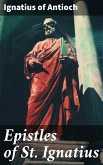The "Epistles of St. Ignatius" serves as some of the earliest and most profound writings of the Christian Church, offering insights into the theological and ecclesiastical concerns of the late first century. Composed in a brief yet compelling literary style, these letters are addressed to various Christian communities and are imbued with Ignatius's fervent advocacy for Church unity and authority. Characterized by their polemical fervor and pastoral care, the epistles also illuminate early Christian rituals, moral teachings, and the significance of martyrdom, reflecting the turbulent socio-religious landscape of the time. Ignatius of Antioch, a pivotal figure in early Christianity, was a disciple of the Apostle John and later became the bishop of Antioch. His writings emerged against a backdrop of persecution and heretical challenges, which profoundly shaped his theological perspectives. His commitment to defending orthodox faith and establishing hierarchical church structures is mirrored in each letter. Ignatius's journey towards martyrdom, during which he penned these epistles, encapsulates his resolve to affirm Christian doctrine in the face of adversity. Highly recommended for scholars, theologians, and lay readers alike, the "Epistles of St. Ignatius" offers a rich tapestry of early Christian thought. It not only contributes to understanding the historical development of Christian doctrine but also resonates with contemporary discussions on unity and the ecclesiastical identity of the Church.
Dieser Download kann aus rechtlichen Gründen nur mit Rechnungsadresse in A, B, BG, CY, CZ, D, DK, EW, E, FIN, F, GR, H, IRL, I, LT, L, LR, M, NL, PL, P, R, S, SLO, SK ausgeliefert werden.









